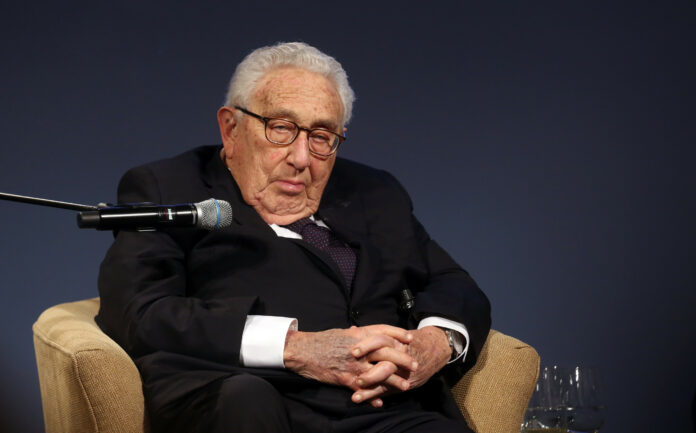The death of Henry Kissinger, the former secretary of state and one of most divisive political figures in U.S. history, brought a mixture of tributes and contempt for his legacy from people around the world.
Kissinger, who was 100, died at his home in Connecticut, his consulting firm, Kissinger Associates Inc., confirmed. A public memorial service will be held in New York at a date yet to be announced.
The influential, but controversial, adviser was a key White House figure during the Richard Nixon administration, and played a pivotal role in bringing a ceasefire in the 1973 Arab-Israeli war, boosting diplomatic relations between the U.S. and China, and calming hostilities with the Soviet Union during the Cold War. He was awarded a Nobel Peace Prize in 1973 for negotiating the Paris treaty, which ended the Vietnam war, along with North Vietnamese negotiator Le Duc Tho.
Kissinger, who also acted as an adviser to other U.S. presidents and political figures, was widely condemned for decades over claims his foreign policies resulted in the deaths of millions, and some people accused him of being a war criminal.
Adam Berry/Getty Images
While he was credited for negotiating an end to the war, Kissinger was also blamed for helping to escalate the conflict in Vietnam for years. Tho refused to accept the joint Nobel Peace honor, and the decision to award the prize to Kissinger resulted in two Nobel committee members quitting.
Kissinger supported the secret bombing campaign on Cambodia, a country the U.S. was not at war with at the time. The Nixon administration said it was done to destroy the movement of troops and supplies from North Vietnam to communist forces in South Vietnam. The bombing resulted in the deaths of tens of thousands of civilians, with the destabilization of Cambodia ultimately leading to a civil war and the deadly regime of dictator Pol Pot.
Kissinger has also been criticized for his support of other brutal regimes across the world, including the CIA-backed overthrowing of a left-wing government in Chile, the invasion of Angola by an apartheid regime, as well as Indonesia’s invasion of East Timor in 1975 and the near decade long “dirty war” carried out by Argentina’s military dictatorship against left-wing political opponents.
Former President George W. Bush was one of those to pay tribute to Kissinger, saying the U.S. has lost one of its “most dependable and distinctive voices on foreign affairs.”
Tricia Nixon Cox and Julie Nixon Eisenhower, the daughters of former president Nixon, said Kissinger and their father had a partnership “that produced a generation of peace for our nation.”
“In the Nixon administration, Dr. Kissinger conducted the lengthy and often frustrating negotiations in Paris to win peace with honor in Vietnam,” the statement said, via NBC News.
Former New York Mayor Rudy Giuliani described Kissinger on X, formerly Twitter, as “not just the foremost expert on foreign policy, but he was a great teacher and someone I’m proud to call a friend.”
Historian and author David Rothkopf, a former managing director of Kissinger Associates, described the former secretary of state as “complicated as he was famous,” while noting that “virtually every national security adviser since Kissinger had worked directly for him or worked for someone who worked directly for him.
“He made some terrible decisions as Secretary of State and National Security Advisor and backed some terrible ideas and people afterwards. But, he was also a great student of foreign policy and for many, a teacher,” Rothkopf wrote. “For better and for worse, he influenced world affairs for six decades as no other comparable U.S. figure did.
“Condemn him, applaud him—he deserves both reactions—but if you care about foreign policy you will study him and you should.”
Others were quick to condemn the legacy of the 100-year-old in the wake of his death, and some people openly celebrated.
A crowd of Free Palestine protesters in New York City erupted in cheers on Wednesday night as the news broke, according to video posted to social media.
In a post on X, the left-wing media company The International posted the “many crimes of Henry Kissinger” while detailing tallies of deaths in countries such as Cambodia, Chile, Argentina and Vietnam.
Author and journalist Andrea Pitzer added: “When I went to Chile for my concentration camp book, I talked to so many who held Kissinger responsible for destroying their country & their lives. They were tortured in horrific ways, detained in heinous conditions, then often exiled for years. May they sleep peacefully tonight.”
CodePink, the anti-war feminist activist group, called Kissinger a “ruthless war criminal” following his death.
“From Chile and Argentina to East Timor, Vietnam, Cambodia, and beyond, Kissinger leaves a shameful legacy of terror, torture, and mass killing,” the group said. “May his passing bring us closer to peace & liberation.”
Chris Hazzard, a Sinn Fein politician who represents South Down in Northern Ireland, posted on X: “Henry Kissinger is dead He was undoubtedly one of the worst war criminals of the 21st century. An imperial exceptionalist, he was responsible for the torture & death of millions of civilians in Latin America & Asia.”
Heinz Alfred Kissinger was born into a Jewish family in the German city of Fuerth on May 27, 1923. His family fled Nazi Germany in 1938 and settled in New York, where Heinz changed his name to Henry.
During a CBS interview in the run-up to his 100th birthday, Kissinger dismissed accusations that some of his foreign policies amounted to a crime.
“That’s a reflection of their ignorance,” Kissinger said. “It wasn’t conceived that way. It wasn’t conducted that way.”
Uncommon Knowledge
Newsweek is committed to challenging conventional wisdom and finding connections in the search for common ground.
Newsweek is committed to challenging conventional wisdom and finding connections in the search for common ground.


